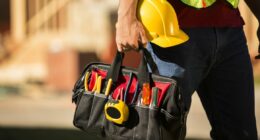Share this @internewscast.com
Experts say there are legitimate reasons why high-income earners may be paying no tax, but it does raise questions around whether the system could be fairer — especially for those who don’t have the same opportunities to benefit from tax deductions.
Why some people don’t pay tax
For example, those who earn income generated overseas may have already paid tax in a foreign country. Australia has treaties with most countries, so residents don’t pay double tax.
Superannuation earnings in the draw-down or retirement phase are also not taxed, something that has been described by former federal treasury secretary Ken Henry as “stupid”.
‘Unfair’ system that disadvantages wage and salary earners
A study by UNSW found high-income taxpayers were best able to mitigate their tax liability because they were more likely to have access to different business structures.
For someone [earning] salary and wages … there aren’t any sophisticated structures that we can use.
“A business can claim a tax deduction for most expenses they incur in carrying on your business if they are directly related to earning your assessable income.”

Business owners are able to claim tax deductions easier than wage and salary earners. Source: Getty / Krisanapong Detraphiphat
Eslake says income from capital gains, dividends, partnerships, trusts and superannuation funds is also taxed at lower rates than wages and salaries.
But they reported $430.4 million in capital gains, which are profits from the sale of investments such as property, shares and crypto assets.
Something that’s fundamentally unfair about the tax system is that it does discriminate against wage and salary earners.
“Personally, I think that’s unfair between rich and poor, and it’s also unfair between old and young.”

Salary and wages make up a small portion of the $52.4 million in income reported by 91 individuals who paid no tax in 2022-23. Source: SBS News
The worst offenders when it comes to tax avoidance
He says the ATO estimates small business discrepancies make up around 40 per cent of the tax gap, amounting to $17.7 billion of the $44.5 billion gap in 2021-22.
They don’t put a lot of resources into making sure small businesses comply because there are so many of them.
“The tax office would know who those people are, they will have gone over their affairs with a pretty fine-tooth comb and if they’re not paying tax, it would be for a good reason,” he says.
High-income earners better able to take advantage of tax deductions
The group reported a total income of $461.8 million, but their deductions came to $390.3 million. One person claimed $8 million in dividend deductions alone.

Some of the tax deductions claimed by 91 individuals in Australia who paid no tax in 2022-23. Source: SBS News
But the results for this group are likely to differ this financial year, as they are set to lose a significant source of deductions.
In 2022-23, they claimed $63 million for the cost of managing their tax affairs, but the overwhelming majority of this money ($58 million) was for interest charged by the ATO for late payment of taxes and penalties.
“It’s not an expense necessarily incurred in producing accessible income — like interest on a loan taken out to purchase an investment property or the cost of cleaning work clothes such as a uniform — and it is not a policy purpose, such as donations to registered charities … so it shouldn’t be a tax deduction,” he says.
‘National hobby’ in Australia to avoid paying tax
Jericho says many tax concessions, such as the capital gains tax discount and negative gearing, are viewed as legitimate and this encourages people to change their behaviour to avoid paying tax.
It almost seems sometimes that one of the national hobbies is trying to find ways to avoid tax.
“We should have people feeling that paying taxes is a good thing because it delivers all our services.”

Taxes fund our roads, schools and other services Australians rely on. Source: AAP / Luke Costin
Kayis-Kumar says Australia has an over-reliance on personal income tax and former treasury secretary Ken Henry has warned about the intergenerational unfairness of the system.
“This is a really important conversation to be having about income inequality and wealth inequality, and how can we use tax policy and design to mitigate the effects rather than [tinker] on the sidelines,” Kayis-Kumar says.
What changes could be made?
But a second study found the ability for individuals to direct deductions between personal and corporate income may dampen the effectiveness of such a change.
“It’s more attractive to put income into pots where the tax rate’s lower, and to put deductions into pots where the tax rate is higher.”
Support needed for changes
For example, if Australia reduced the number of deductions available and lowered tax rates simultaneously, most people wouldn’t get much of a refund at the end of the financial year.
In Australia, especially, we love our tax refund culture, so it’s really hard to unpick all of that in a way that will get everyone on board.
“It would be simple and I think it would be fair,” Eslake says.














